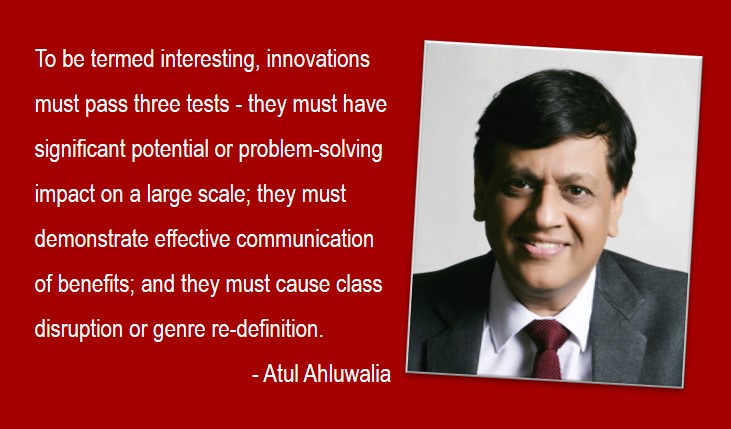 We live amidst wonder and walk and breathe as much among the craftwork of giants as of the efforts of the not so large but equally significant and unsung wizards of disruption. Irrespective of their size it is always fascinating to learn from innovators.
We live amidst wonder and walk and breathe as much among the craftwork of giants as of the efforts of the not so large but equally significant and unsung wizards of disruption. Irrespective of their size it is always fascinating to learn from innovators.
The enabling criteria: To be termed interesting, in our view, innovations must pass the following three tests: one, they must have significant potential or problem-solving impact on a large scale; two they must demonstrate effective communication of benefits; and thirdly they must cause class disruption or genre re-definition.
The Big-Boys of innovation
Innovation is an effective enabler for scale. There are a number of examples of today’s big boys who had a humble beginning not too long ago. The category redefinition of affordable, quality flying as brought in by Indigo and its founder Aditya Ghosh is a bellwether for true-blue innovation. By directly taking on the established players, re-orienting business processes to ensure on-time arrivals and departures and delighting flyers with friendly, impeccable service, IndiGo has now posted its eighth consecutive year of profits (in its ten-year history) and simultaneously became the largest domestic airline by market share in India.
Another interesting innovator is Ritesh Agarwal of OYO, who innovated in the hospitality space by providing travellers affordable, easy to locate stay options when and where they wanted. This customised, personalised, and friendly business model pioneered via a tech-enabled, mobile-app based solution has transformed the Indian travel industry forever. No wonder, OYO now has dozens of imitators and copycats.
Ankur Jain of B9 Beverages, the makers of the hugely successful Bira brand of beer, is an innovator that is both the darling and the envy of his trade. An Indian beer, with a largely word-of-mouth marketing and communication model, crafted at the highest levels of global quality and appealing in taste, flavour and emotional connect, disrupted the Indian liquor market and is already among the top two beer brands in the premium segment.
An outstanding interesting innovation of the more known and recognized variety is the beverage brand Paper Boat created by Neeraj Kakkar. Leveraging nostalgia as the force multiplier, drawing on the product value of tradition and heritage, and successfully applying the power of communication through imagery, this beverage brand is now the cynosure of the best and the biggest. In an already overcrowded category, Neeraj innovated with memory association as a brand salience and triumphed.
In the case of Magsaysay Award winner Anshu Gupta who started the now famous and seminal NGO Goonj, his social innovation involves utilizing clothing materials and garments as well as utensils, furniture, and food grains collected from cities and making them available as a development resource in rural India. Villagers work to dig wells, clean ponds, repair roads, and build schools using local resources for which the compensation is the earlier collected material resources. The ‘Cloth for Work’ campaign is now a recognized and applauded unparalleled social innovation.
Unsung, but no less better
In India, two areas which have greatly benefited from the non-glamorized power of innovative excellence are the social and rural sectors. In the case of rural innovations, the choices which make the ‘interesting’ cut are just too many to be listed. However, after careful evaluation of their benefits and impact to society and people at large, these innovations are second to none.
In the case of IISc-crafted ‘SuryaGen Solar Water Purifier’, for example, it can transform water from any source – rain-water to sea– into drinking water. This device can purify acidic and poisonous water too and thus promises to be a boon to farmers and communities across India.
Equally interesting and effective is the ‘Tree Climbing’ machine made by an innovative farmer from Kannur, Kerala, the late Mr. M J Joseph alias Appachan, a school dropout but a persistent person. His innovation has transformed the lives of this trade and revived a dying profession and given hope and pride to a whole community.
Social and governance-based innovations are also winners in the interesting innovation category. The remarkable Cane-based Prosthetic Limbs, has been developed by Arun Cherian of the Bangalore-based Rise Legs in collaboration with a local cane artist, Rahman Abdul. Socially very impactful, people with these prostheses cannot just walk, but also run, play and dance.
Mention must also be made here of a far-reaching governance innovation which promises to rectify a perennial problem and provide a better quality of life to millions. The ‘Intelligent Water Management System’ for smart cities. Developed by SenRa and Chariot, this system relies on intelligent water meters and devices using the Internet of Things (IoT) to communicate intelligently over a long range and thus help in effectively managing water resources for the city network as a whole.
David with Goliath, not versus
Better and improved lives of citizens in general and better ways of going about our businesses are in effect the outcome of innovation somewhere. All that they need to become a resounding success is positive communication energy. An idea which germinates from a creative spark finds success with adoption, implementation and commercialization only when we are able to do an effective outreach. The Davids of the innovation world can in no time emerge the Golaiths of the future, albeit if they do not lose sight of powering their innovations with business outcome focused communication.
For more conversations around Innovation (if you are an in-house communications professional), attend the Innovation First Communication Conclave in Gurgaon on Wednesday, March 14th, 2018.
The views expressed here are that of the author and do not necessarily reflect that of Reputation Today.







Be the first to comment on "India’s most Interesting Innovators"